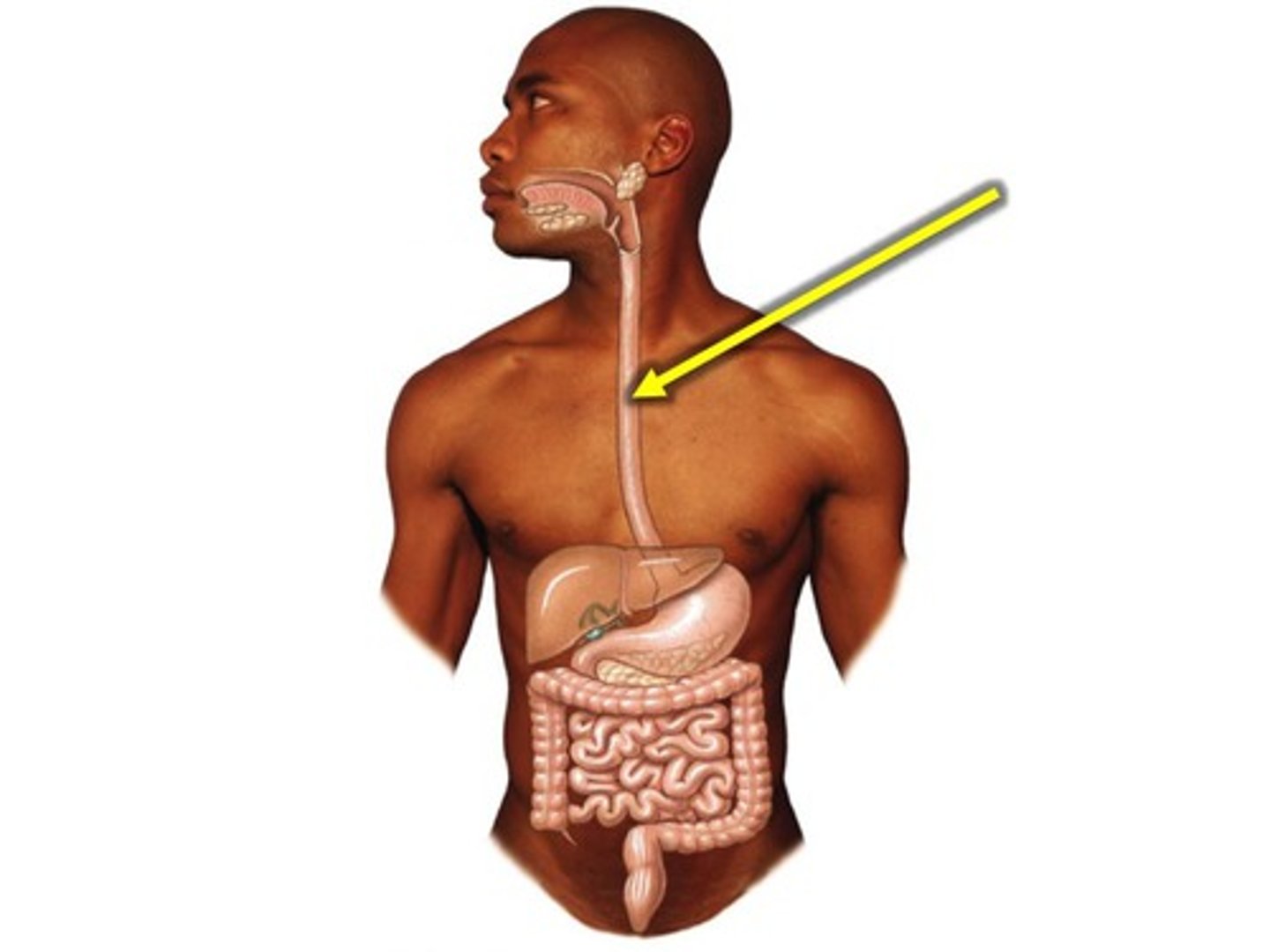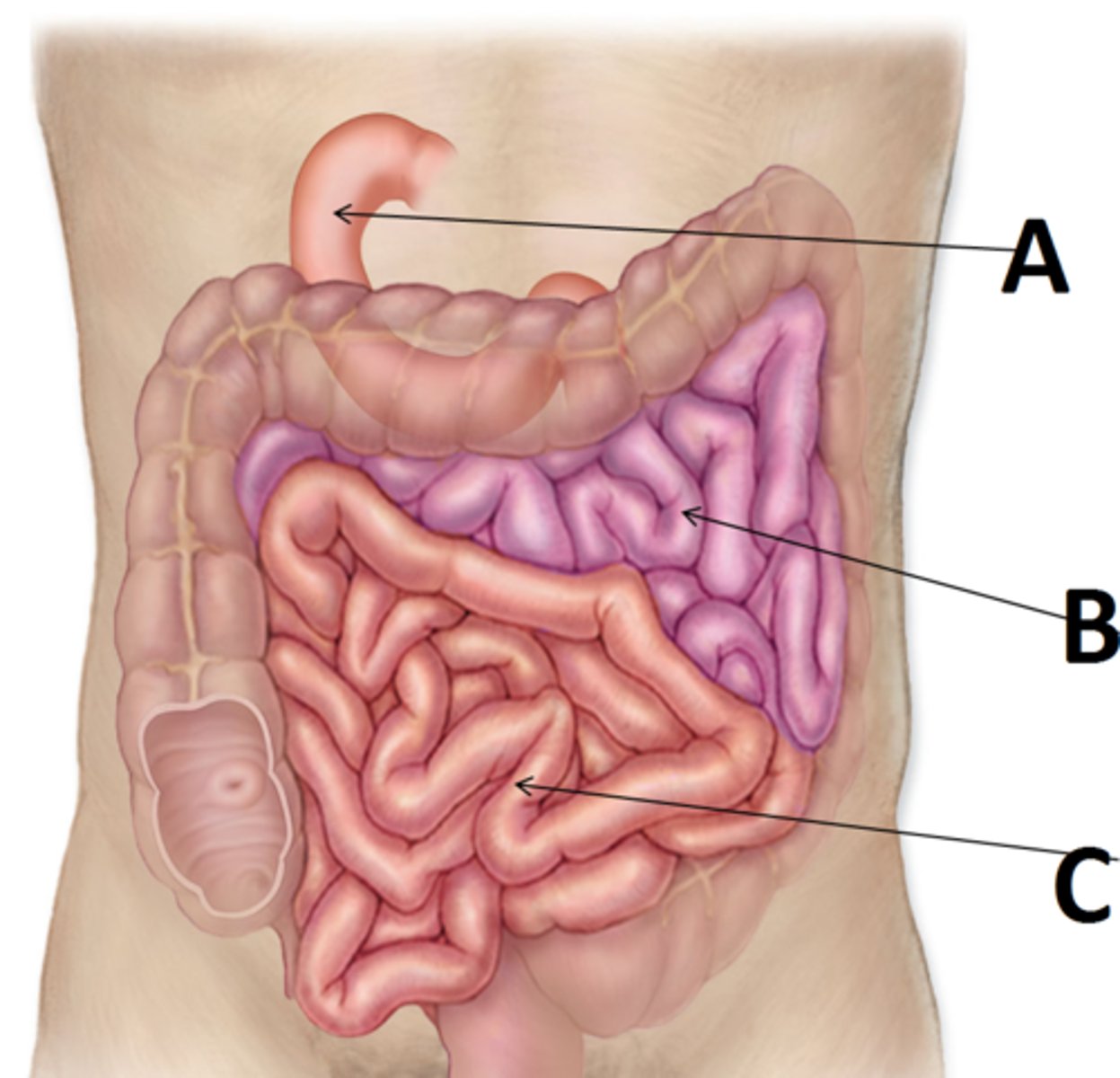McGraw Hill Chapter 25 (The digestive system)
1/46
There's no tags or description
Looks like no tags are added yet.
Name | Mastery | Learn | Test | Matching | Spaced |
|---|
No study sessions yet.
47 Terms
What is Excretion?
The process of separating wastes from the body fluids & eliminating them from the body
What part (a cavity) of the digestive systems functions in ingestion, speech, & respiration?
Oral cavity
The portion of a tooth that is above the gum is known as?
The crown of the tooth
Which describes tooth enamel?
A call-free protective layer over the crown
Which describes dentin?
A yellowish tissue forming the bulk of the tooth
Which are functions of saliva?
Aids in swallowing, dissolves molecules so they can be tasted, cleanses mouth & teeth
Which are found in saliva?
Lipase, amylase, mucus, lysozyme, water
As a group, the salivary glands located outside of the oral mucosa are categorized as what?
Extensive salivar
What is the straight muscular tube conveying food from the pharynx to the stomach called?
Esophagus
Another name for the act of swallowing is?
deglutition
State another term for the process of chewing:
Mastication
What is gastroenterology?
The study of the digestive tract
Which are the pancreatic enzymes that digest protein?
Carboxypeptidase, chymotrypsin, trypsin
List in order from smallest to largest, the segments of the small intestine:
Duodenum, Jejunum, Ileum
Which valve is found at the junction of the small & large intestines?
Ileocecal
The term Villi refers to what?
The small fingerlike projections of the lining of the small intestine
Which reflex is triggered by food in the stomach, relaxes the Ileocecal valve, & allows residue into the cecum?
Gastroileal
The mucus-secreting cells in the epithelium of the intestine are called what?
The goblet cells
What is the function of the brush border?
To increase surface area for absorption
What substrate goes with the pancreatic enzyme amylase?
Starch
What substrate goes with the pancreatic enzyme Ribonuclease?
RNA
What substrate goes with the pancreatic enzyme Lipase?
Fats
What substrate goes with the pancreatic enzyme Trypsin?
Proteins
What substrate goes with the pancreatic enzyme Deoxyribonuclease?
DNA
The insulin-secreting accessory organ of the digestive system that is both an endocrine & exocrine gland is what?
The pancreas
The duct that runs lengthwise through the pancreas, joining the bile duct at the hepatopancreatic ampulla is what duct?
The pancreatic duct
The ____ of the pancreas secrete sodium bicarbonate, while the ______ of the pancreas secrete digestive enzymes.
Duct cells; acinar cells
Which pancreatic secretion neutralizes the acid in the chyme arriving in the duodenum?
Sodium Bicarbonate
Trypsinogen is converted to trypsin by what?
Enteropeptidase
Which are pancreatic zymogens?
Chymotrypsinogen, Trypsinogen, Procarboxypeptidase
Chymotrypsinogen is converted to chymotrypsin & procarboxypeptidase is converted into carboxypeptidase by what enzyme?
The enzyme trypsin
The pancreas secretes sodium _____ into the duodenum in order to neutralize acid arriving from the stomach.
Bicarbonate
List in order the passage of bile from its point of secretion in the liver to the duodenum:
(1) Bile canaliculus, (2) Bile ductile, (3) Hepatic duct, (4) Common hepatic duct, (5) Bile duct.
Within the hepatic lobules, hepatocytes secrete bile into narrow channels called what?
Bile canaliculi
Bile passes from the bile canaliculi into the bile _______ before it flows into the hepatic ducts.
Ductules
What is a goblet cell?
A mucus-secreting epithelial cell
What is a lacteal?
A lymphatic capillary within a villus used for lipid absorption
Which enzymes are located within the plasma membrane of enterocytes in the small intestine?
Brush border enzymes
The tubular glands within the mucosa & submucosa of the small intestine are called what?
Intestinal crypts
What is the function of the duodenal glands?
To secret bicarbonate-rich mucus to neutralize stomach acid
Which of the following are found in intestinal juice?
Mucus & Water
Which of the following is achieved with small intestinal muscle contractions?
The propelling of contents along the intestines, An increased contact of chyme with the intestinal lining, The mixing of chyme with secretions
Muscular contractions called _____ involved altering ring-like constrictions at several places along the intestine.
Segmentation
Which contractions begin after digestion & absorption of nutrients is completed & move chyme toward the colon?
Migrating motor complex
The segment of the digestive tract indicated in this figure is...
Esophagus

Which segment of the alimentary canal is indicated by this figure:
Pharynx

Match each label with its smallest Intestine segment of A,B, & C?
(C) Ileum, (A) Duodenum, (B) Jejunum
